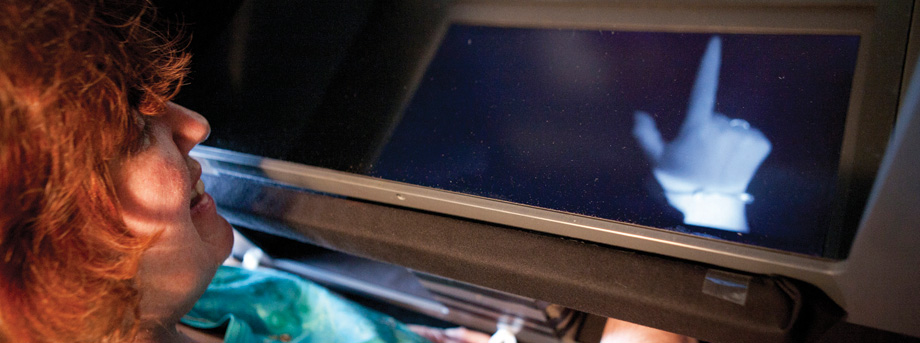The magic finger…
May 6th, 2011
An accidental discovery by academics at the University has shown that a simple illusion can significantly reduce — and in some cases temporarily eradicate — arthritic pain in the hand.
By tricking the brain into believing that the painful part of the hand is being stretched or shrunk, researchers were able to halve the pain felt by 85% of sufferers they tested.
The research could point to new technologies which could help patients to improve mobility in their hand by reducing the pain they experience during physiotherapy.
The Nottingham team stumbled on its finding by chance at last year’s community open day. People had been invited to experience body distortion illusions used for every day research with Nottingham’s unique MIRAGE technology. This takes a real-time video image of a hand and uses computer manipulations combined with physically pulling or pushing to fool the brain into believing the hand is stretching or shrinking.
The technology has been used for research into body representation — the way in which our brain puts together what we see and what we feel.
Dr Roger Newport, who is leading the research in the School of Psychology, said: “The majority of people who come to these fun events are kids — the illusions really capture their imagination and they think it’s a cool trick and can become a bit obsessed with working out how we do it.”
Dr Catherine Preston, who is now at Nottingham Trent University and collaborated on the study, added: “The grandmother of one of the children wanted to have a go, but warned us to be gentle because of the arthritis in her fingers. We were giving her a practical demonstration of illusory finger stretching when she announced: “My finger doesn’t hurt any more!” and asked whether she could take the machine home with her! We were just stunned — I don’t know who was more surprised, her or us!”
The team contacted an osteoarthritis support group and asked them to take part in tests to confirm the effectiveness of MIRAGE for pain relief.
The study attracted 20 volunteers with an average age of 70, all clinically-diagnosed with arthritic pain in the hands and/or fingers and none medically managing their pain on the day by anything stronger than paracetamol. Before the test they were asked to rate their pain on a 21-point scale, with 0 indicating no pain and 20 representing unbearable pain.
The team then compared the MIRAGE body illusion to just physically pushing and pulling on the painful parts of the volunteers’ hands to test the effect on their pain. Other control tests were conducted by stretching or shrinking a non-painful part of the hand and visually enlarging or reducing the hand.
The results showed a marked reduction in pain — on average halving the discomfort for 85% of volunteers. Stretching or shrinking the painful part – combined with physical manipulation – temporarily eliminated pain in a third of volunteers. Anecdotally, many volunteers also reported an increased range of movement.
The work is at an early stage and further studies are needed. The researchers have secured a £23,000 Serendipity Grant from the Dunhill Medical Trust. There is also potential for collaboration with colleagues at the Arthritis UK Pain Centre at the University to study the brain’s role in mediating pain.
“This is an excellent example of how fundamental research can often produce unexpected and significant results,” said Dr Newport. “In my early career I was lucky enough to receive internal funding to develop the MIRAGE technology which is unique to the University. Without that support we never would have unearthed this surprising and exciting result, which potentially could be extremely important to the millions of people who suffer from this painful and debilitating illness.”
Comments are closed.
Other News

Need news? See you on SharePoint
After 14 years of service, Campus News is being retired as the university’s staff news platform. […]

Roads and car parks closed for refurbishing work
As part of ongoing road improvements at the university, works will be taking place to resurface […]


